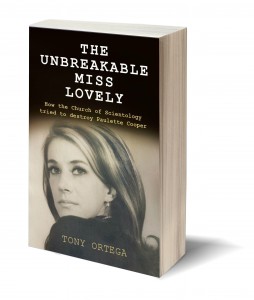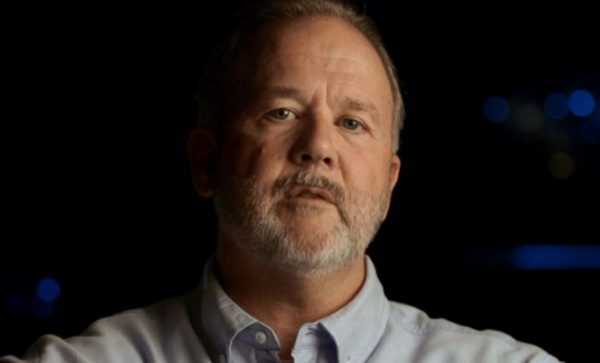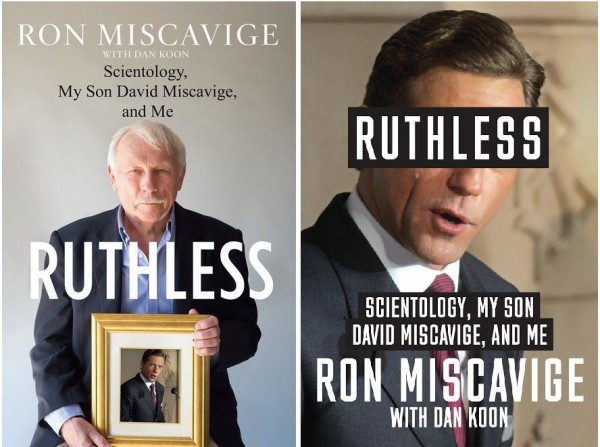Late last night, Marty Rathbun posted at his blog a lengthy broadside criticizing Ron Miscavige’s memoir, Ruthless: Scientology, My Son David Miscavige, and Me.
The book came out in May and describes how Ron Miscavige introduced his son, church leader David Miscavige, to Scientology in 1969 as they looked for a solution to the 9-year-old’s asthma. The entire family eventually got into Scientology and moved to England to pursue courses and so David could become an auditor. After returning to the US, David got close to Scientology founder L. Ron Hubbard and eventually, after Hubbard’s death in 1986, took over the organization. In 1985, Ron, a musician, joined the “Sea Org” and played trumpet and led Scientology’s orchestra, which played frequently at church events around the world. But eventually, as Ron describes in his book, he became disaffected with Scientology under the dictatorial rule of his son, and in March 2012 he and his wife Becky Bigelow escaped from a compound near Hemet, California.
After that escape, Ron learned that his son had assigned private investigators to follow him, and David also instructed his sisters, Denise and Lori, to cut off ties with their father. That’s what motivated him, Ron says, to write his book and reveal what a totalitarian ruler his son had become. His book was a bestseller, and it was featured on a highly watched episode of ABC’s 20/20 program.
But now, Rathbun, who had at one time been the second-highest ranking executive in the church and who has spent years exposing David Miscavige’s shortcomings, has surprisingly come to Dave’s aid, denouncing Ron’s book about his son as full of “hearsay.”
In a lengthy blog post, Rathbun produces a withering attack on the book.
— Rathbun says he offered to fact-check the manuscript, but Ron and his publisher, St. Martin’s Press, turned him down.
— Rathbun claims that he wanted to keep Ron from publishing “defamations” against his son that would end up having “deleterious emotional and spiritual effects” on Ron.
— After Ron’s 2012 escape, Rathbun tried to correct stories Ron was hearing about his son, but Ron printed the rumors instead of Rathbun’s facts.
— Rathbun claims he warned Ron against the “moral propriety” of writing a tell-all about his own son.
— Rathbun says he counseled Ron that if he wanted to keep his family intact, he wouldn’t “cavort” with “people who are actively attacking Scientology.”
— Because Ron turned down Rathbun’s offer of help, the book is “chock-full of hearsay, double hearsay, and anonymous hearsay.”
— Rathbun says Ron avoids blaming himself for his own role in producing the person David Miscavige is today. Ron instead blames his deceased first wife and L. Ron Hubbard for making Dave aggressive and a complainer.
— Rathbun criticizes Ron’s citation of the book The Sociopath Next Door to diagnose his son, when it was probably Ron’s neglect that made Dave the way he is.
— In 1998, Rathbun says, he was charged with gathering up people for the St. Petersburg Times to interview to paint a glowing portrait of Dave and his upbringing. In the course of that effort, Ron admitted to him that he had “beat the hell” out of his son and felt guilty for it.
— In 1981, Rathbun witnessed David Miscavige prevent his father from getting into a brawl in New Orleans following the Super Bowl. Ruthless doesn’t give Dave credit for the repeated ways he kept his dad out of trouble, Rathbun says.
— Rathbun says Ron invited the kind of smears that Scientology is throwing at him, including the unrelated criminal investigation that Ron’s son, Ron Jr., went through that Scientology featured on one of its smear websites and that we wrote about recently.
— Rathbun saves for last his agreement with the Church of Scientology’s official position that it’s “provable bullshit” that private investigators Dwayne and Daniel Powell spoke directly to David Miscavige when he told them to do nothing as they watched Ron Miscavige apparently suffering from a heart attack. (He wasn’t, but the Powells didn’t know that.) Rathbun casts doubt on the story, saying that over his more than 20 years in Scientology, “David Miscavige never once spoke to a private investigator.” What Rathbun doesn’t say, however, is that it was the Powells, not Ron Miscavige, who said that David Miscavige spoke to them directly on a telephone, and they said so while being questioned by West Allis, Wisconsin police in taped interviews as part of a criminal investigation.
Early this morning, we swapped messages with Ron’s co-writer, Dan Koon, who said he’d make sure Ron saw Rathbun’s review, and then would let us know if they wanted to make a statement.
Rathbun isn’t the first of Scientology’s critics to raise issues with Ron’s book; we found reviews by John Duignan and our commenter Once Born to be thoughtful pieces. In general, many people anticipated that Ron’s book would be a blockbuster of insider revelations about Scientology, David Miscavige, and perhaps Tom Cruise and Dave’s missing wife, Shelly Miscavige. But it turned out that Ron was often not around his son, and had little access to insider information. He and co-writer Dan Koon also repeatedly praised Scientology founder L. Ron Hubbard, and numerous passages in the book try to convince the reader that there’s really something to Scientology’s processes. For that reason, the book was something of a let-down for church critics who were looking for a “killing blow” after Alex Gibney’s documentary Going Clear and Leah Remini’s tell-all, Troublemaker, which both came out in 2015.
So Rathbun isn’t the first to be disappointed with Ruthless. But the context of Rathbun’s review is fascinating for any longtime Scientology watcher, and in particular for the way he repeatedly rails against the “anti-Scientology camp.”
Mark “Marty” Rathbun is a former top Church of Scientology executive who left the organization in 2004, disappeared so thoroughly some thought he was dead, then resurfaced and started his blog in 2009. For the next couple of years, Rathbun’s daily revelations about what it was like to work at the highest levels of the church made his website, as we said at the time, the single biggest challenge to the survival of the church itself. In particular, Rathbun denounced Scientology leader David Miscavige daily, and as a result Rathbun soon became the focus of a campaign of retaliation by the church with a group of private investigators and other operatives that lasted for at least five years.
Rathbun’s decision to go public with his insider information about Miscavige made him a media star. He was the centerpiece of the Tampa Bay Times’ massive 2009 series, “The Truth Rundown,” he was the subject of countless print and video interviews, and he is one of the central figures of three feature-length documentaries (Channel Four’s Scientologists at War, HBO’s Going Clear, and Louis Theroux’s upcoming My Scientology Movie).
It’s been fascinating watching Marty’s website change over time. Initially, he appeared to be the leader of a new movement of “independent Scientologists” who blamed Miscavige for ruining what they believed had been a thriving and more benevolent organization under founder L. Ron Hubbard. But later, Rathbun increasingly found fault with Hubbard himself, and we watched with interest as his comments section became something of a war zone between more and less doctrinaire “indies.” Eventually, on February 3, 2015, Rathbun produced a remarkable post he titled “Scientology Beliefs.” In it, he reduced Scientology to a mix of “pop psychology and hypnotism” that was so ineffective, it couldn’t even measure up to a placebo effect.
Scientologists were purposely kept blinded to that ineffectiveness, Rathbun wrote, by a method that was “carefully designed and administered…so as to lead Scientologists to wholeheartedly accept and live according to these beliefs.”
Six years after Rathbun had emerged as a leader of indies, he was now saying that Scientology — the subject itself, and not just David Miscavige’s mismanagement of it — was a con. And anyone who stood in its way, Scientology wanted dealt with brutally.
“Enemies, including psychs as well as anyone expressing any doubt or reservation about these beliefs, must be destroyed by any means necessary by Scientologists. Such means include lying, suing, cheating, harassing, intimidating, blackmailing, smearing and by physical violence,” Rathbun wrote.
And what has made Rathbun so interesting, especially to journalists, is that for many years, it was Rathbun whose job it was to smear and blackmail and intimidate Scientology’s enemies. In Scientology, he had been the “Inspector General – Ethics” of the Religious Technology Center, Scientology’s nominally controlling entity whose chairman of the board, David Miscavige, is known simply as “C.O.B.” to church members. That position, as Miscavige’s enforcer, put Rathbun in charge of running Scientology’s legendary dirty tricks campaigns against perceived enemies.
So it was something journalists often raised with Rathbun (and that Theroux makes a central focus of his movie): While Rathbun had clearly suffered intense harassment since coming forward as a whistleblower, in particular by a bizarre group of church operatives that called itself the “Squirrel Busters,” it was Rathbun himself who had run similar operations on behalf of the church against earlier whistleblowers.
It’s a question that tends to enrage Rathbun, and it does to great effect in Theroux’s film, as viewers will see as the movie opens in Australia this week, the UK in about a month, and the US in January.
If it’s legitimate to ask about Rathbun’s past as a Scientology enforcer, there’s simply no question that Marty and his wife, Monique, were subjected to one of the most elaborate and intense campaigns of retaliation since the days when Scientology was trying to frame journalist Paulette Cooper for a felony and almost drove her to suicide in the early 1970s. In 2013, Monique, who had never been a member of the Church of Scientology, filed suit against Miscavige and the church, and we watched closely as the harassment lawsuit moved through the courts, resulting in a couple of very favorable rulings.
But this January, Monique suddenly fired her entire legal team and, a few months later, withdrew from the lawsuit.
Naturally, many of our readers wondered if a settlement had been reached between the Rathbuns and the church. But their former attorneys — who would still be entitled to a percentage of any settlement — were unaware that any deal had been reached. And Marty himself, at his blog, said that there was no settlement. Since then, Rathbun has used his blog to attack the notion that dropping the lawsuit wasn’t a sensible idea, and there’s been no more criticism of David Miscavige and the Church of Scientology.
This new piece, with its defenses of David Miscavige and its repeated sneers at the “anti-Scientology” crowd, is another surprising evolution for Marty Rathbun, a figure who continues to fascinate us.
UPDATE: Just wanted to point out something that we remembered after finishing the post. Marty’s “evidence” against the Powells’ assertion that they heard from Miscavige on the phone is that, in his experience, Marty never witnessed Miscavige talk to a private investigator directly.
But in the only other case of Scientology PIs coming forward with details about their work, Paul Marrick and Greg Arnold (who were originally hired by Marty) told us personally that they had, in fact, heard directly from Miscavige on the telephone, asking about their daily work following Pat Broeker.
So, two sets of private eyes have come forward in the history of Scientology post-Hubbard, and each of them say they heard directly from Miscavige on the phone with instructions.
Something to keep in mind.
——————–
Chris Shelton on ‘Scientology’
——————–
 Posted by Tony Ortega on September 1, 2016 at 07:00
Posted by Tony Ortega on September 1, 2016 at 07:00
E-mail tips and story ideas to tonyo94 AT gmail DOT com or follow us on Twitter. We post behind-the-scenes updates at our Facebook author page. After every new story we send out an alert to our e-mail list and our FB page.
Our book, The Unbreakable Miss Lovely: How the Church of Scientology tried to destroy Paulette Cooper, is on sale at Amazon in paperback and Kindle editions. We’ve posted photographs of Paulette and scenes from her life at a separate location. Reader Sookie put together a complete index. More information about the book, and our 2015 book tour, can also be found at the book’s dedicated page.
Learn about Scientology with our numerous series with experts…
BLOGGING DIANETICS: We read Scientology’s founding text cover to cover with the help of L.A. attorney and former church member Vance Woodward
UP THE BRIDGE: Claire Headley and Bruce Hines train us as Scientologists
GETTING OUR ETHICS IN: Jefferson Hawkins explains Scientology’s system of justice
SCIENTOLOGY MYTHBUSTING: Historian Jon Atack discusses key Scientology concepts
Other links: Shelly Miscavige, ten years gone | The Lisa McPherson story told in real time | The Cathriona White stories | The Leah Remini ‘Knowledge Reports’ | Hear audio of a Scientology excommunication | Scientology’s little day care of horrors | Whatever happened to Steve Fishman? | Felony charges for Scientology’s drug rehab scam | Why Scientology digs bomb-proof vaults in the desert | PZ Myers reads L. Ron Hubbard’s “A History of Man” | Scientology’s Master Spies | Scientology’s Private Dancer | The mystery of the richest Scientologist and his wayward sons | Scientology’s shocking mistreatment of the mentally ill | Scientology boasts about assistance from Google | The Underground Bunker’s Official Theme Song | The Underground Bunker FAQ
Our Guide to Alex Gibney’s film ‘Going Clear,’ and our pages about its principal figures…
Jason Beghe | Tom DeVocht | Sara Goldberg | Paul Haggis | Mark “Marty” Rathbun | Mike Rinder | Spanky Taylor | Hana Whitfield








